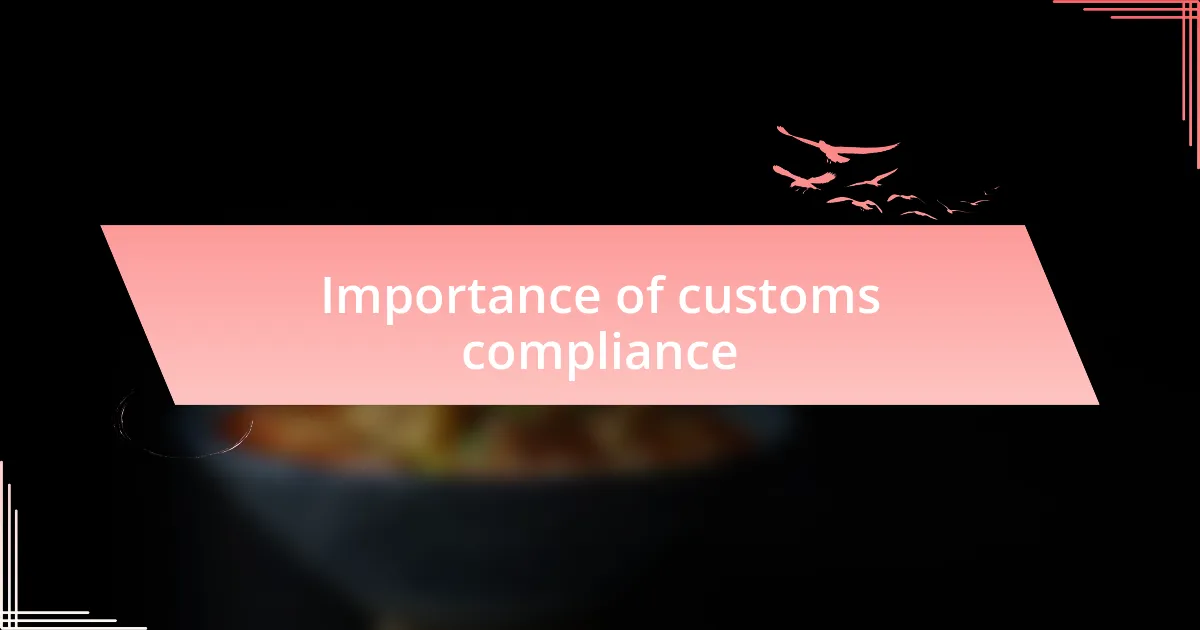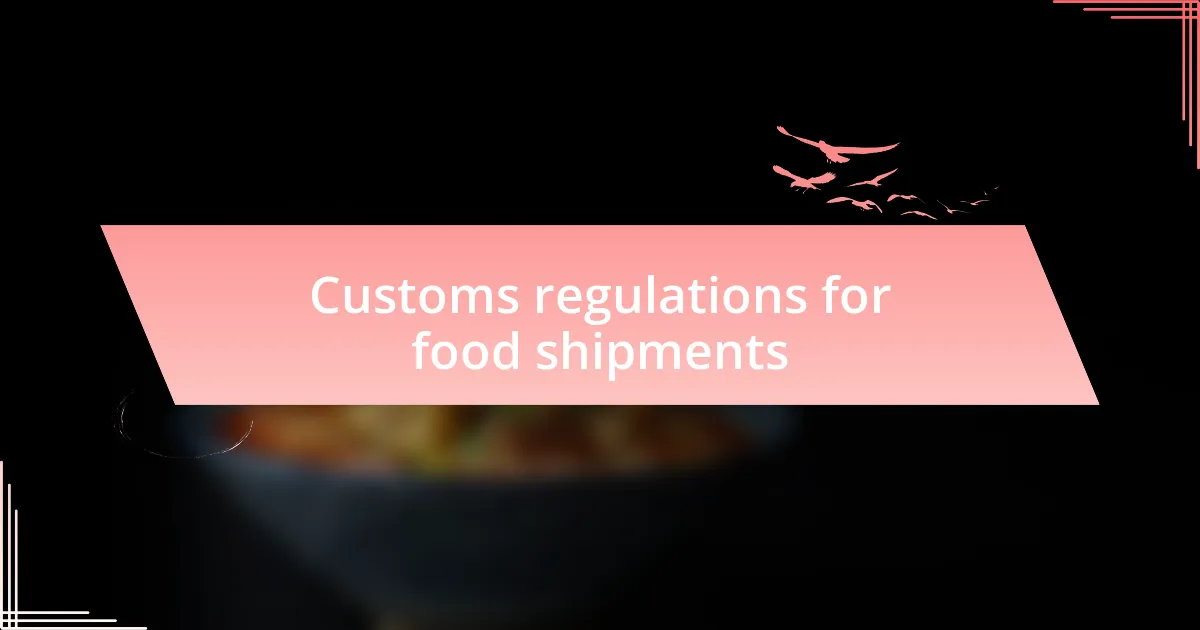Key takeaways:
- Customs compliance is essential for the food business, as it impacts operational efficiency and market access.
- Attention to detail in documentation and understanding regulations can prevent costly delays and build trust with suppliers and customers.
- Leveraging technology and building relationships with customs brokers can streamline the compliance process and provide valuable insights.
- Adaptability and continuous learning about customs regulations are crucial for successful international shipping.

Understanding customs compliance
Customs compliance can often feel overwhelming, especially in the food business where regulations can change frequently. I remember the first time I dealt with shipments overseas; it was like navigating a maze without a map. It sparked a realization—understanding these regulations is not just about paperwork; it’s about ensuring safety and quality for consumers.
I’ve found that every country has its own set of rules regarding food imports, which adds another layer of complexity. For instance, I once faced a situation where a shipment was held up due to inadequate labeling. This taught me the significance of precise labeling that meets international standards. It was stressful, but it highlighted the need for meticulousness in customs documentation.
Have you ever wondered how a single mistake in customs paperwork can derail an entire shipment? I experienced this firsthand. That lapse not only delayed delivery but also cost my business significantly. The intricacies of customs compliance are daunting, but with the right knowledge and attention to detail, navigating this landscape becomes more manageable, and ultimately rewarding.

Importance of customs compliance
Customs compliance is crucial for the food business because it directly impacts both ease of operation and market access. I vividly recall a time when I missed a crucial deadline for a customs submission, which not only delayed our shipment but also led us to miss a major food festival. It was disheartening to see our products stuck at the border while competitors seamlessly showcased theirs.
Moreover, customs compliance builds trust with both suppliers and customers. I once partnered with an international supplier who was hesitant to work with me initially, fearing potential customs issues. After we meticulously followed customs regulations and demonstrated our compliance knowledge, they felt safer doing business with us. This experience reinforced my understanding that being compliant is not just a legal obligation; it’s about building relationships and a reputation in the global market.
Have you considered how customs compliance can safeguard your business from hefty fines? I recall hearing horror stories from colleagues who faced severe penalties due to overlooked regulations. They learned the hard way that investing time and resources into understanding customs requirements can save a business not only money but also its reputation. Each requirement is a stepping stone toward operational success.

Customs regulations for food shipments
Understanding customs regulations for food shipments is absolutely essential. Each country has specific guidelines regarding food safety, labeling, and documentation. I remember the stress of preparing a shipment for a trade show when I realized that I hadn’t accounted for the stringent organic certification requirements in the destination country. It was a scramble to gather the necessary paperwork, a lesson learned the hard way.
Moreover, you can’t overlook the varying import restrictions that can catch even seasoned professionals off guard. I once watched as a well-prepared shipment got held due to a sudden ban on certain ingredients, which left us scrambling to find alternatives at the last minute. In moments like these, I often reflect: how well do we really know the markets we’re dealing with? Staying informed about these regulations isn’t just about legal compliance; it’s about ensuring that we can deliver our products without disruption.
Engaging with local customs authorities can also be invaluable. Speaking with them directly has helped me clarify confusing rules, which has saved time and unnecessary delays. I recall a time when a simple phone call not only eased my concerns but also provided insights into new guidelines I was unaware of. Cultivating these relationships can turn hurdles into opportunities—can you think of how networking with customs agents could reshape the way you handle your shipments?

My challenges with customs compliance
Navigating customs compliance can often feel like walking through a maze, and I’ve faced my share of dead ends. There was a time when a misinterpretation of a labeling requirement resulted in a shipment being detained for days. The frustration and anxiety in those moments was intense; I could almost feel the ticking clock as I worried about our customers waiting for their products.
On another occasion, I encountered unexpected duties that severely impacted my budget. I’ll never forget the sinking feeling when I discovered that an ingredient I thought was duty-free wasn’t. That experience taught me that every detail matters. It made me question how thorough my research really was. Am I doing enough to protect my business from these unforeseen costs?
One of the continuous challenges I’ve faced is the need for constant updates on regulations. Just when I thought I had everything down pat, a new trade agreement would come to light, altering the landscape once again. I often wonder if there’s a “secret” to staying ahead—how can we keep pace with such rapid changes in customs law while juggling daily operations? It’s a constant balancing act, and I find myself seeking better resources to stay informed and agile.

Solutions to customs compliance issues
When it comes to tackling customs compliance issues, leveraging technology has been a game changer for me. By using specialized software that tracks regulations and updates in real time, I’ve significantly reduced the risk of mislabeling or misinterpreting requirements. Have you ever felt the relief that comes from knowing you have reliable support in place? It’s like having a safety net beneath you as you navigate the complexities of international shipping.
Another effective strategy has been building strong relationships with customs brokers. I remember when a broker provided me with insights about pending regulatory changes that I would have otherwise missed. Their expertise not only saved me time but also helped me avoid potential pitfalls. How much easier could your shipments become with a trusted partner by your side?
Lastly, I’ve found that investing in training for my team has paid off tremendously. When everyone is on the same page about customs compliance, it creates a culture of diligence and awareness. There’s something empowering about knowing that my staff feels confident handling the intricacies of customs. What could it mean for your business if your team saw compliance as a shared responsibility rather than a burden?

Best practices for food export
Best practices when exporting food are crucial for ensuring smooth transactions and meeting regulatory standards. One practice I swear by is thoroughly researching the import requirements of the destination country before shipping anything. I recall a time when I overlooked a specific packaging regulation for a batch of organic spices destined for Europe. It turned out to be a costly oversight that led to a shipment delay. What if I had taken those extra moments to double-check?
Documentation is another area where attention to detail can make a world of difference. I always make sure to include all necessary certificates, such as phytosanitary and health certificates, when exporting food products. One instance that stands out for me was when I meticulously prepared my shipment for fresh produce, ensuring all labels were compliant, and the result was a hassle-free clearance at customs. Have you experienced the satisfaction of getting everything just right?
Moreover, I find that consistent communication with logistics partners enhances the entire process. A well-coordinated communication strategy helps in addressing any potential issues before they escalate. I remember collaborating closely with my freight forwarder on a particularly complex export, and their proactive updates kept the whole operation running smoothly. How much smoother could your shipping process be with open lines of communication?

Lessons learned from my experience
One major lesson I’ve absorbed is the importance of understanding the nuances of customs compliance—not just the regulations, but how they can vary by region. I remember a stressful situation when I faced unexpected tariffs because I didn’t realize the destination country had specific quotas on certain food items. It taught me that staying informed about these subtleties can prevent headaches down the line. How well do you know the regions you’re exporting to?
Another significant takeaway is the value of creating a solid checklist for shipments. During one particularly hectic export run, I rushed through my usual process and missed a vital export document. This resulted in customs holding my shipment for longer than expected. It became clear that investing the time upfront to develop a detailed checklist not only helps avoid issues but also grants peace of mind. Are you as organized as you could be in your shipping preparations?
Finally, staying adaptable is crucial in the ever-changing landscape of customs regulations. I recall a time when last-minute policy changes were announced, catching many exporters off guard, but I had cultivated relationships with local experts who helped me navigate the shifts smoothly. This experience reinforced how vital it is to stay engaged and adaptable, as flexibility can be your greatest asset in compliance. How ready are you to adjust your strategies as needed?